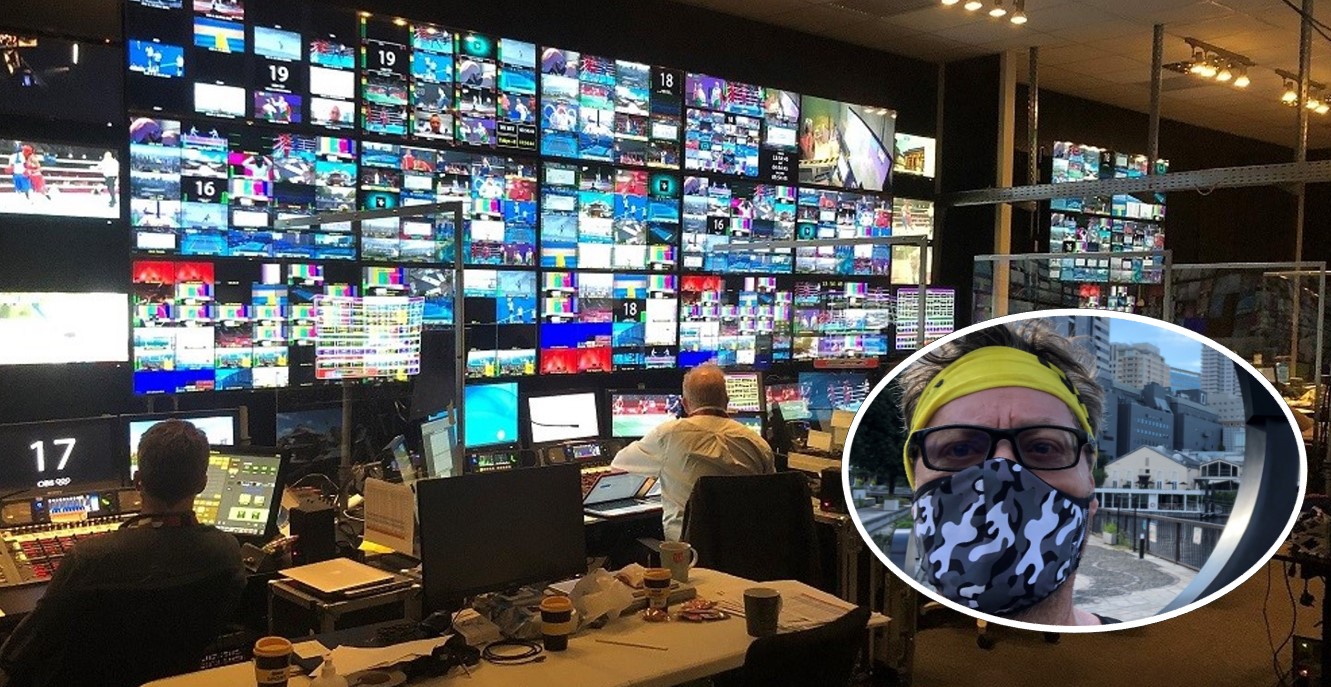A GRADUATE’S 'EYE VIEW' OF THE TOKYO OLYMPICS! 
28 July 2021
With the world now well and truly gripped by the exertions and achievements of athletes competing at COVID-19 delayed Games of the XXXII Olympiad in Tokyo, BAFTA award-winning Queen’s alumnus Jonny Bramley, BSc Computer Science (1987) and Graduate of the Year (2016), gives us a unique account of the Olympic Games.
“Having been to every Olympic Games since Barcelona ‘92, each has thrown up its own set of difficulties but it’s fair to say Tokyo 2020, taking place amidst a global pandemic, has been by far the most challenging,” said BBC stalwart Jonny Bramley, Executive Producer Major Events since 2003, and former Executive Producer of the London Games in 2012.
Olympic veteran Jonny joins five other Queen’s graduates in Tokyo who will be competing on the world's most competitive stage over the coming weeks. For him though, preparations have been somewhat different.
“When the Covid countermeasures that would be put in place to ensure a safe Games were announced at the start of the year, it became clear that the BBC could no longer accommodate the numbers we had originally planned on sending to Tokyo.
“This necessitated rapid re-engineering of our broadcast model, creating a studio and production base in MediaCity UK, Salford and moving our presenting and commentary teams from Tokyo back to the UK.
“It was not only a huge technical challenge but also an editorial one – an Olympic Games tends to be about more than just the sport: it’s the people and culture of the host city that are so important, and our team wouldn’t be there to experience it and describe it.”
With the Tokyo Olympics in doubt until just a few days before last week’s opening ceremony, the Games with no spectators have, it would seem, already captured the public imagination just like any other.
Remote cameras and pagodas
How have the restrictions impacted on television coverage of the largest sporting spectacle on the planet and how exactly does Jonny and the team produce those spectacular studio pictures we see on our TV screens?
“I’ve been in Japan for three weeks, based in the International Broadcast Centre (IBC). It houses the Host Broadcast operation (Olympic Broadcasting Services, or OBS) and many thousands of staff from Rightsholding Broadcasters, of which the BBC is one.
“Our Master Control Room takes in the 80-plus Host Broadcast feeds as well as our own cameras in the ‘mixed zones’ (where the athletes are interviewed post-event), associates them with the correct audio (including commentary from Salford) and distributes them on a smaller number of international circuits to the UK.”
Some of the other measures the BBC have had to take include the installation of remote cameras in the Olympic Village to minimise contact with athletes, and the creation of a rooftop pagoda with the Tokyo skyline in the background.
“We’ve been fortunate that we intended to present in Tokyo from a ‘green screen’ virtual reality studio – so we are able to use the same model in Salford. If you haven’t seen it already it’s a huge open-air structure on the roof of a Tokyo skyscraper and looks spectacular!”
And what about getting there in the first place at a time when there are so many severe international travel restrictions; how difficult was it logistically to move a production team to Tokyo?
“From a personal point of view there have been a number of issues to overcome – the strict safety measures meant it was a monumental task to get the team to Tokyo through an extensive testing and quarantine regime – and all of us have been in isolation for our first 14 days.
“Fortunately we have been allowed to travel between our accommodation and place of work during that time – however, it was a relief to finally be allowed out in the city.
“With a state of emergency in place and no bars or restaurants open after 8pm, my only excursion so far has been a run around the local landmarks.”
Despite the long hours – and with a substantial measure of team work – everything was set up in time and things are now running smoothly. As well as keeping everything on track Jonny has been engaging in the obligatory rounds of television interviews and IOC meetings as well as reporting back to his alma mater in Belfast!
“After four days Team GB have had their most successful start to an Olympic Games, and despite the lack of crowds the coverage has looked good on TV. But as successfully as things have turned out, I can’t help but feel sorry for our Japanese hosts.
“The venues are stunning, the people are so welcoming and this could have been one of the best Olympic Games ever. I hope they get the chance again soon."
London 2012 - Olympic connections
When he's not travelling the world with work, Jonny is an active member of the Queen’s University Association London (QUAL). With an Olympic connection, Jonny met his fiancée Suzanne Allen - a Queen's Business Information Technology graduate (2011) - at a QUAL event to showcase the role of Queen’s graduates at the London 2012 Games, attended and addressed by Olympic Gold Medal winner and Honorary Queen's graduate Lady Mary Peters, amongst others.
Jonny and Suzanne got engaged on 27 March 2021 on Pig Island in Strangford Lough on a blustery Saturday afternoon during a trip home to Northern Ireland.
If you would like to support the next generation of athletes at Queen’s visit the Queen’s Foundation website or contact Paddy Gilmore, Queen’s Development and Engagement Manager, Queen’s Sport.
For general enquiries about this story, or to submit graduate news items, please contact Gerry Power, Communications Officer, Development and Alumni Relations Office, Queen's University Belfast.
Back to Main News
Top of Page